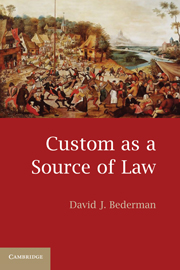2 - Culture
The Western Legal Tradition of Positivism
Published online by Cambridge University Press: 05 June 2012
Summary
If anthropology and ethnography have conditioned our understanding of the law of preliterate peoples and nonstate societies, cultural traditions have formed our judgments about the role of customary norms in “sophisticated” legal systems. In large measure, these cultural and social values have been transmitted to us today through the medium of the Western legal tradition. And although the very concept of a distinctive Western jurisprudential approach is a morally freighted idea and heavily contested in the literature, it remains a useful point of reference for any discussion about the role of custom in law. As a matter of necessity, the Western customary law tradition is a cultural and historical construct that begins with Roman law, continues with its first reception in medieval Europe, and then climaxes with its later intellectual revival and transformation in the nineteenth century.
Given custom’s cultural milieu, the central problem is appreciating whether custom is a species of natural law or positive law. This goes to such questions as whether a practice can displace a contrary statute (or other form of positive law-making authority) or can be in conflict with right reason. Can custom subsist in both local and general forms or just apply to particular groups or institutions within a polity? And (reverting to a matter raised in the last chapter) what exactly converts an informal usage into a binding custom? Framing these inquiries in this manner does not necessarily presume whether unenacted legal norms practiced by a community and respected as law are a form of positive law (and thus directly linked to the assent of the individuals following them) or of natural law (and so independently based on the exogenous morals and values of the relevant community without reference to consent).
- Type
- Chapter
- Information
- Custom as a Source of Law , pp. 16 - 26Publisher: Cambridge University PressPrint publication year: 2010



